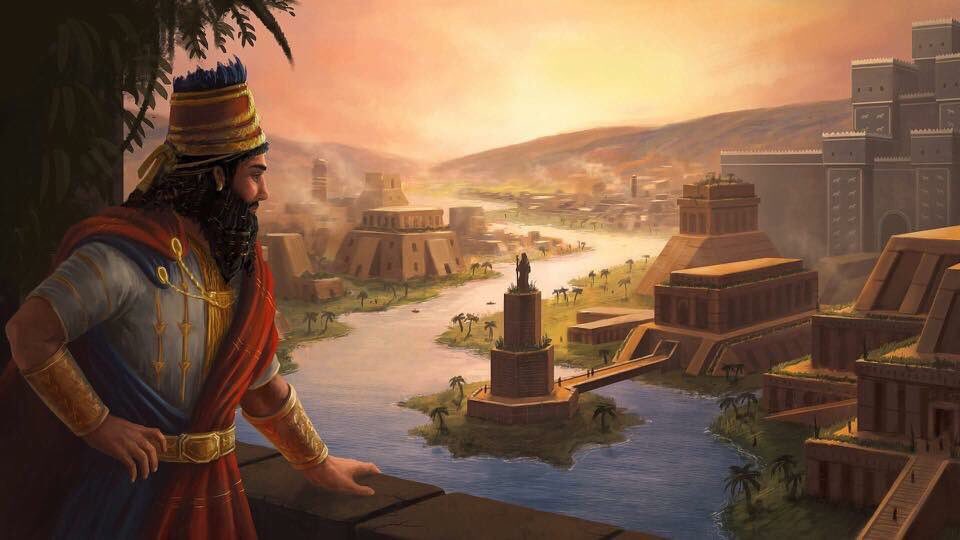
THREAD: Fun with Genealogies.
Soon after the Israelites’ conquest of the trans-Jordan, the Machirites (descendants of Manasseh) came to Moses in order to raise the issue of Zelophehad’s inheritance.
Soon after the Israelites’ conquest of the trans-Jordan, the Machirites (descendants of Manasseh) came to Moses in order to raise the issue of Zelophehad’s inheritance.
Zelophehad had only fathered daughters.
Hence, if his daughters married Israelites from a different tribe, the Machirites would lose a sizeable chunk of their land-inheritance.
Hence, if his daughters married Israelites from a different tribe, the Machirites would lose a sizeable chunk of their land-inheritance.
At first blush, the Machirites’ concern seems reasonable enough.
But it also raises a question.
But it also raises a question.
Intertribal marriage doesn’t appear to have been the norm at the time (e.g., Judg. 14.3). Why were the Machirites so concerned about it?
The answer, I suspect, is hinted at in 1 Chronicles’ genealogies.
Machir had recently provided wives for another tribe—for the Benjaminites ‘Huppim’ and ‘Shuppim’ (1 Chr. 7.15 w. 6-12)—,
which is a noteworthy detail since it reflects more widespread connections...
Machir had recently provided wives for another tribe—for the Benjaminites ‘Huppim’ and ‘Shuppim’ (1 Chr. 7.15 w. 6-12)—,
which is a noteworthy detail since it reflects more widespread connections...
... between the Gileadites and the tribe of Benjamin.
Consider, for instance, Jeiel, the founder/populater of Saul’s hometown, Gibeah-aka-Gibeon (1 Chr. 8.29 w. 1 Sam. 21.6).
Consider, for instance, Jeiel, the founder/populater of Saul’s hometown, Gibeah-aka-Gibeon (1 Chr. 8.29 w. 1 Sam. 21.6).
Jeiel’s wife is named named ‘Maacah’ (מַעֲכָה), which is a distinctive name.
It’s the name of a region somewhere around the border between Manasseh and Syria (cp. Deut. 3.14 [w. 1 Chr. 2.23], Josh. 12.5, 13.11, 2 Sam. 10.6, 1 Chr. 19.6),
It’s the name of a region somewhere around the border between Manasseh and Syria (cp. Deut. 3.14 [w. 1 Chr. 2.23], Josh. 12.5, 13.11, 2 Sam. 10.6, 1 Chr. 19.6),
and it’s the name of at least five different individuals in Israel’s history, many of whom have connections with the region of Syria:
🔹 a daughter of Talmai (from Geshur in Syria),
🔹 a daughter of Absalom, named after his wife Maacah, the daughter of Talmai (1 Kgs. 15),
🔹 a daughter of Talmai (from Geshur in Syria),
🔹 a daughter of Absalom, named after his wife Maacah, the daughter of Talmai (1 Kgs. 15),
🔹 a concubine of Caleb the Kenizzite (cp. 1 Chr. 2.48 w. 49, Judg. 1), who bears two children, one of whom (תִּרְחֲנָה) (Greek Θαρχνα) seems to be named after the Luwian storm-god ‘Tarhunta’,
🔹 a wife of Machir (the Gileadite), and
🔹 a sister of Machir (1 Chr. 7.15–16).
🔹 a wife of Machir (the Gileadite), and
🔹 a sister of Machir (1 Chr. 7.15–16).
Note: If the name ‘Maacah’ is related to the Syriac verb MʕK = ‘to push down, subdue’, it could have a similar sense to the name ‘Tarhunta’ (‘conquerer’), on which see @OlaWikander’s thread:
https://twitter.com/OlaWikander/status/1402009605664870403
We therefore have good reason to see Maacah as a name of Syrian/trans-Jordanian origin,
which raises the question of where the wife of Jeiel (Gibeah’s founder) came from.
which raises the question of where the wife of Jeiel (Gibeah’s founder) came from.
A sensible guess might be Jabesh-Gilead (in the trans-Jordan).
In Judges 20, the Jabesh-Gileadites refused to go to war against the Gibeahites,
so the Israelites took women from Jabesh-Gilead and gave them to the (almost-extinct) Benjaminites to help them repopulate their land.
Was Jeiel’s wife Maacah one of these women?
so the Israelites took women from Jabesh-Gilead and gave them to the (almost-extinct) Benjaminites to help them repopulate their land.
Was Jeiel’s wife Maacah one of these women?
If so, it would explain the close connections between the Jabesh-Gileadites and Saul the Gibeahite (i.e., the descendant of Jeiel and Maacah: 1 Chr. 9) reflected later in the Biblical narrative.
In particular, it would explain:
In particular, it would explain:
a] Saul’s unexpected eagerness to assist Jabesh-Gilead when its inhabitants came under siege (1 Sam. 11), and
b] the Jabesh-Gileadites’ keenness to give Saul an honourable burial (cp. 1 Sam. 31; note also 2 Sam. 2.8–9, where Saul’s son flees to Gilead and sets up base there).
b] the Jabesh-Gileadites’ keenness to give Saul an honourable burial (cp. 1 Sam. 31; note also 2 Sam. 2.8–9, where Saul’s son flees to Gilead and sets up base there).
And of course, since Manasseh (Joseph’s son) and Benjamin were sons of the same mother (and camped next to one another around the Tabernacle: Num. 2), it would have been natural for the two tribes to have developed connections. 

Might it also explain why Phinehas the high-priest from Gibeah (cp. Josh. 24.33 w. 18.28) unexpectedly turned a blind eye to a suspicious altar in Gilead (Josh. 22.31–32)?
Either way, Biblical genealogies are a mine of remarkable information.
</END>
Either way, Biblical genealogies are a mine of remarkable information.
</END>
• • •
Missing some Tweet in this thread? You can try to
force a refresh












